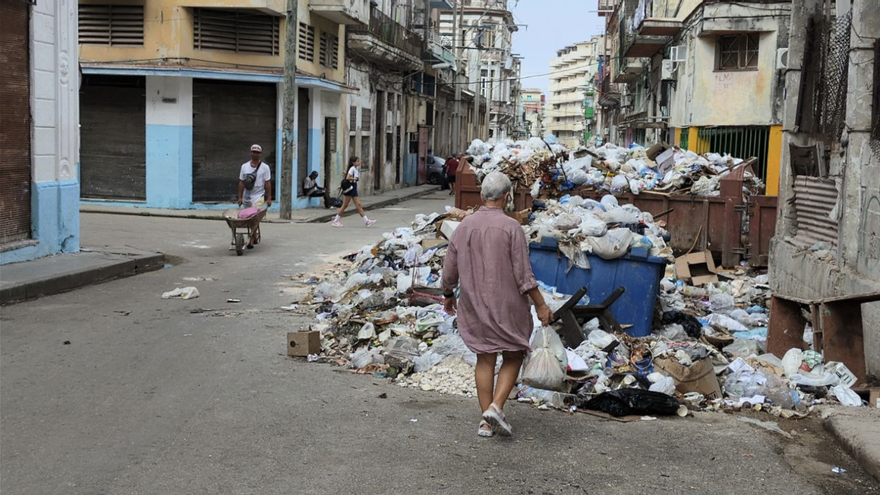
![]() 14ymedio, Havana, December 26, 2023 — Cases of leptospirosis are increasing, the health authorities of Guantánamo announced on Monday, after informing the official press that this year 44 people are suspected of having contracted the disease, 12 more than those counted in 2022. So far, they acknowledged, two deaths have been reported in the municipalities of Imías and Maisí.
14ymedio, Havana, December 26, 2023 — Cases of leptospirosis are increasing, the health authorities of Guantánamo announced on Monday, after informing the official press that this year 44 people are suspected of having contracted the disease, 12 more than those counted in 2022. So far, they acknowledged, two deaths have been reported in the municipalities of Imías and Maisí.
In addition, the municipalities with the highest incidence of leptospirosis in the province are Baracoa, Maisí, Guantánamo and Yateras, the local newspaper Venceremos reported. Mileidys Gómez, head of the Zoonosis program of the Provincial Directorate of Hygiene, Epidemiology and Microbiology, told the media that many of the people who are infected end up suffering serious symptoms because they do not immediately go to the doctor.
However, Yamilé, a 45-year-old woman from Havana interviewed by 14ymedio, says that the official is not telling the truth about the sick people. A few months ago, she says, she went to the hospital because she suspected that she had contracted the disease. “The first thing they told me was that if I had leptospirosis I would have to rest and drink a lot of water, because there were no medicines,” says Yamilé, while questioning why the authorities insist that “it is people’s fault for not going to hospitals if there is not even anything to treat them with.”
After being scared in the hospital, where they finally told me that it was not leptospirosis that I had, I decided to ’harvest’ the rats
The truth, she explains, is that “these diseases, such as leptospirosis, dengue or cholera arise from the poor hygiene of Cuban cities, where garbage piles up in any corner and rots there for days.” This, she adds, happens not only in Havana, but in any part of the country where “the same unhealthy situation exists.”
“After being scared in the hospital, where they finally told me that I didn’t have leptospirosis, I decided to ’harvest’ the rats that got into my house on the street or in the neighboring courtyards,” says the woman. “The first day I bought the traps, seven little rats were trapped. They had my yard full of tunnels to go from one house to another.”
“It’s just that with the level of dirt in this country, it’s no wonder. Rats must be partying. Our building is surrounded by four huge garbage dumps that are about to shake hands and close the circle,” she continues. “There are side streets where Communal Services sometimes take weeks to collect the garbage, and in the meantime, the plagues of cockroaches and rodents begin to infest the houses. The sellers of traps and poisons are going to get rich,” she says.
Yamilé has another concern, which is that for months she has not seen anyone selling poison or traps. “Before there were some old men who sold syringes with liquids to kill rats or balls of poison. Now you have to buy everything from [the classifieds website] Revolico. For example, a set of three strips of rubberized cardboard to treat rodents costs more than 2,000 pesos. Almost no one can afford this, because they need the money to eat,” she explains.
According to the habanera, by simply having adequate hygiene the Cuban neighborhoods could get rid of the plague of rats, but this is not possible either, since the mountains of garbage are added to the lack of cleaning products. “Even domestic animals end up sick,” she says.
“Most end up dying, because if there is no medicine for people, imagine for animals”
“A couple of months ago, my neighbor’s dog contracted leptospirosis, and in the veterinary clinic itself a worker told her that cases of this disease have increased a lot lately among pets. Most end up dying because, if there is no medicine for people, imagine for animals,” Yamilé says. The vaccine against leptospirosis in dogs is barely found in the country’s veterinary offices, and its price in the informal market is high, so many pet owners rule out immunizing them.
Far from the cities, in the fields and food warehouses, the plague of rats is also a pressing problem. This was recognized by the authorities of Guantánamo, who revealed that many of the cases of leptospirosis in the province were contracted while carrying out “agricultural work on moist land highly infested with rodents” that already carry the disease and transmit it through urine or other secretions.
“The lack of rat poison, the breeding of animals in urban communities without hygienic conditions and the non-use of means of protection for those permanently exposed” are other causes of the high rate of infection, Venceremos said.
Unfortunately, “the deficit of antileptospirotic vaccines” and the “low perception of the population in the face of risk conditions and the appearance of symptoms” make it impossible for the Health and Epidemiology system to treat in time or prevent the increase in cases, the health authorities acknowledged.
Translated by Regina Anavy
____________
COLLABORATE WITH OUR WORK: The 14ymedio team is committed to practicing serious journalism that reflects Cuba’s reality in all its depth. Thank you for joining us on this long journey. We invite you to continue supporting us by becoming a member of 14ymedio now. Together we can continue transforming journalism in Cuba.
